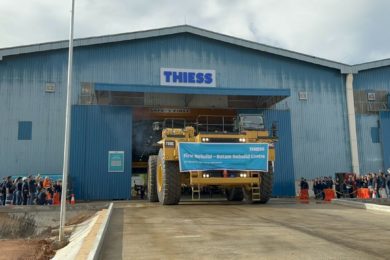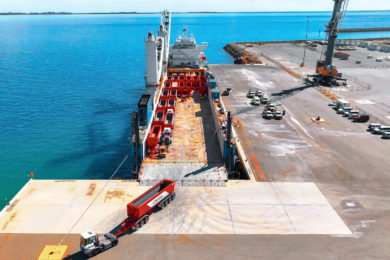Over 360 guests from 19 countries attended the 14th International DMT MiningForum in the German capital Berlin. The two-day program of presentations and discussions, which was also supported by the VDMA (Germany’s mechanical engineering industry association), focused on current issues such as Industrie 4.0, post-mining activities and the impact of emerging technologies on the demand for raw materials. The following is a report provided by the VDMA.
Sumiya Erdenebulgan is the Vice-President of Erdenes Mongol, Mongolia’s largest state holding company. Among other things, it manages the country’s shares in mining projects which are worth billions. He travelled to Berlin together with Galtbaatar.D, Managing Director of Erdenes Shivee Energy, another state-owned company which has a great impact on the economic development of the country. Both wanted to gather information on the newest developments and trends, particularly those in surface mining. Paul Tim Whillans, head of an engineering firm from Vancouver in Canada, also came to the German metropolis. He wanted to discover “how mining in Europe differs from mining in Canada.” Some of the differences, he stated, “are considerable.”
Whillans and the two Mongolian businessmen were three of the more than 360 participants at the MiningForum, which took place in Berlin at the start of June. The organisers, the DMT Group, an independent service provider in the areas of consulting, engineering, exploration and geotechnics, had chosen the Estrel as the conference venue, the largest hotel in Germany, with 1,125 rooms. Over the course of two days, the program discussed numerous current issues, among them Industrie 4.0, post-mining management, the global potential for raw materials and new aspects of process improvement.
Professor Dr Günther Apel, Head of Mining at DMT, emphasized his country’s position as the world’s largest producer of brown coals. Companies such as Mibrag, RWE, Power AG and the potash and salt producer K+S are big league players. The closure of entire mining regions in Germany also means that there is “leading expertise” in the area of post-mining management. The discontinuation of black coal mining in the country has not, as is commonly perceived by the public and abroad, led to the closure of the entire mining sector in Germany. According to Apel, quite the opposite is true. Uwe Beckmeyer, State Secretary for Energy and European Policy at the Ministry for Economic Affairs, stressed the importance of brown coal for the German economy. The sector employs almost 20,000 workers. In 2015 alone, more than 178 Mt were extracted. With an eye to the future of German mining, Beckmeyer stated: “Being an industrial state is not possible without raw materials.”
Dr Michael Schulte Strathaus, Chairman of VDMA Mining, sees a bright future for the sector. Sales and incoming orders have seen a double-digit increase. The sector is present in all countries where mining is carried out. Schulte Strathaus described Africa as “the new land of the future.” In regard to ongoing debates over the impacts of mining on the environment, which are particularly controversial in industrial states, he reminded the participants that “green energy is not possible without mining.” “An economy without raw materials,” he claimed, “is like a house without foundations.” Schulte Strathaus called for greater objectivity in this debate.
Dr Volker Steinbach, Vice-President of the German Federal Institute for Geosciences and Natural Resources, discussed the impact of emerging technologies on the demand for raw materials. So-called “high-tech” metals, also known as “spice metals”, are becoming increasingly important. Germany must ensure that it has uninterrupted, long-term access to these raw materials. As an example of an emerging technology he pointed to electromobility. In order to meet the growing demand for lithium-ion batteries, more and more cobalt, nickel and graphite will be needed, and rare earths and copper are required for electric motors. As a further example for the shift in demand, Steinbach also mentioned wind power. Here, copper and steel are required for the drives, and rare earths are necessary for the production of the permanent magnets. High-tech metals, Steinbach went on to say, are mostly extracted as a byproduct. “It is unlikely that anyone has ever heard of a gallium or germanium mine.” At present, the recovery of high-tech metals is “very difficult.”
Professor Dr Christian Melchers of the TH Georg Agricola University of Applied Sciences, based in Germany, demanded a greater awareness of post-mining challenges as a “central aspect” of the entire mining process. In 2015, a research centre was established at his university, dedicated solely to post-mining issues. With regard to underground mining, Melchers stated: “It makes neither ecological nor economic sense to extract water from great depths over the long term when there is no need to do so.” Internationally, particularly as far as sustainability is concerned, there is a “huge need.” His institute concerns itself with investigating how post-mining processes can be observed reliably. One of the central research focuses is on monitoring, and in particular on how the process of rising pit water levels can be controlled. The European aerial observation program Copernicus offers great potential in the recording of near-surface mining. However, “a large-scale research and development process” is still necessary in order to fulfil this potential. A further project, which the University is undertaking in cooperation with RAG, focuses on the installation of decentralized surveillance systems at post-mining units, in order to avoid inspections and, as Melchers states, in order to know “what is going on in the shafts” in real time.”
“What is smart-mining?” asked Dr Bernd Länger. “Everyone,” he said, “has different thoughts on this.” Länger works for the German Chamber of Commerce in Sydney, Australia, in the Competence Centre for Mining and Mineral Resources. For the engineer, smart mining means a combination of Industrie 4.0, the “Internet of things” and big data. He claims that automation has nothing to do with Industrie 4.0. Smart mining is concerned with the recording and utilization of data from all production processes. Everything is connected and communicates with everything else, in order to generate an advantage. Länger pointed to studies by the consultancies McKinsey and Digital America. According to these, the mining sector only ranks in 11th place among the 12 large global industrial sectors under examination when it comes to digitalization. The oil and gas industry comes off much better, landing in 7th position. The experiences gathered in the oil and gas industry as well as in other fields could also find application in the mining industry, if adjusted accordingly. According to Länger, there is no need to constantly reinvent the wheel.
As the picture shows, the conference breaks not only offered the 360 participants ample opportunity for discussion, they could also familiarise themselves with the products and services of around 30 exhibitors.










